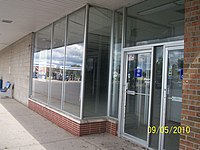Cunningham Drug (U.S.)
| Industry | Retail |
|---|---|
| Founded | October 1889 |
| Defunct | 1991 |
| Fate | Acquired |
| Successor | Various |
| Headquarters | Detroit, Michigan, USA |
Key people | Andrew Cunningham — founder |
| Products | Retail, Pharmacy |
Cunningham Drug was a drugstore chain based in Detroit, Michigan. Founded in October 1889 by Andrew Cunningham, the chain operated primarily within the state of Michigan, and was once the largest drugstore chain in the state. Its Michigan locations were closed and reopened in 1982 as Apex Drug, and were later sold to Perry Drug Stores. The last stores remained open in Florida until 1991, when they were sold to Walgreens.
History

Andrew Cunningham opened the first Cunningham drug store in Detroit in October 1889.[1] In 1931, the 50-store Economical Drug chain, also based in Detroit, consolidated with Cunningham, which at the time had thirteen stores.[1][2] Economical Drug owner Nate Shapero also assumed control of the Cunningham chain. Cunningham announced a merger with Marshall Drug Co. of Cleveland, Ohio in 1940.[3][4]
Between 1958 and 1959, the chain announced mergers with two other chains: Broward Drug of Fort Lauderdale, Florida and Kinsel Drug Co., also of Detroit.[5][6] Following the merger, Cunningham became the largest drugstore chain in Michigan, and had locations in several other states.[1] An effort was made by the United States Department of Justice to dissolve the Kinsel merger, citing that it was in violation of the Clayton Antitrust Act.[7] The dissolution was canceled in 1963.[8]
An acquisition of Whelan Drug in Florida added fourteen more Cunningham locations to that state in 1964.[9] The chain later sold twenty-seven there to Gray Drug of Ohio.[10][11]
The chain sold off twenty-eight of its Michigan stores in 1982 to a private company, which re-branded them as Apex Drug.[12] Three years later, most of the Apex locations were sold to Perry Drug Stores, another chain based in the Detroit metropolitan area.[13]
The remaining Cunningham stores were gradually sold off or shuttered; by late 1991, the last five in operation, all in the Fort Lauderdale, Florida area, were sold to Walgreens.[14]
References
- ^ a b c "Businesses gone but not forgotten: A local legacy of risk-taking". Crain's Detroit Business. 27 June 2001. Retrieved 12 July 2010.
- ^ "Drug merger approved". The Wall Street Journal. 22 October 1931. Retrieved 12 July 2010.
- ^ "Cunningham Drug may get Marshall chain of 42 stores". The Wall Street Journal. 11 October 1940. Retrieved 12 July 2010.
- ^ "Control of Marshall Drug by Cunningham firm likely". The Wall Street Journal. 6 December 1940. Retrieved 12 July 2010.
- ^ "Cunningham Drug Stores". The Wall Street Journal. 31 March 1958. Retrieved 12 July 2010.
- ^ "Cunningham Drug-Kinsel Merger". The Wall Street Journal. 18 November 1958. Retrieved 12 July 2010.
- ^ "Cunningham Drug denies Kinsel purchase violated antitrust act". The Wall Street Journal. 14 September 1960. Retrieved 12 July 2010.
- ^ "Justice Agency ends bid to kill Cunningham's purchase of Kinsel Drug". The Wall Street Journal. 12 April 1963. Retrieved 12 July 2010.
- ^ "Cunningham takes over: Whelan Drugs sells out". The Miami News. 2 November 1964. Retrieved 12 July 2010.
- ^ "Cunningham Drug Stores agrees to sell 28 units in Florida to Gray Drug". The Wall Street Journal. 31 March 1971. Retrieved 12 July 2010.
- ^ "Cunningham Drug completes sale". The Wall Street Journal. 3 May 1971. Retrieved 12 July 2010.
- ^ Pinto, David (18 August 2008). "Devine a link to industry's halcyon days". Chain Drug Review. Retrieved 12 July 2010.
- ^ "Devine, new Affil./Assoc. prez, gears up for the '90s". Drug Store News. 10 September 1990. Retrieved 12 July 2010.
- ^ Altaner, David (4 December 1991). "Pharmacy chain buys A1A store: Cunningham's Drug sold to Walgreen Co". Fort Lauderdale Sun-Sentinel. Retrieved 12 July 2010.
